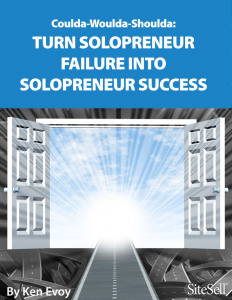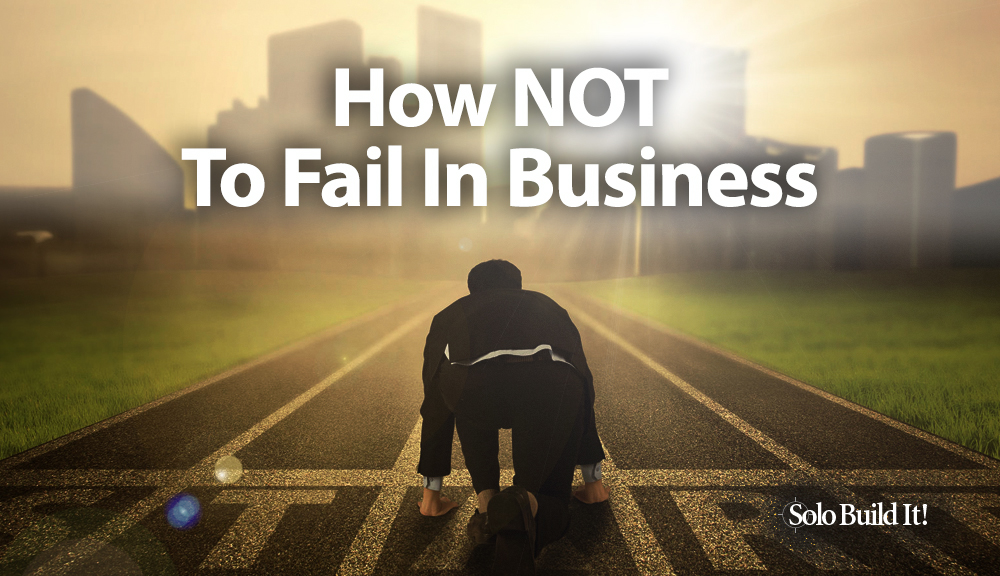
Not sure how to avoid failure in an entrepreneurial business?
Are you worried you might fail after trying to start an online business?
Are you concerned that you might be embarrassed in front of your colleagues? Your friends? Your family?
Worried you’ll become one of those notorious failure stories people always talk about?
You’re not alone.
It’s that fear of failure, in fact, which stops so many would-be solopreneurs dead in their tracks and prevents them from even making the attempt. That’s why we created a free, email course to help solopreneurs overcome those fears and examine how famous entrepreneurs overcame theirs.
Some success experts advise startups to “fail early, fail fast, and fail often.” That’s fine if you’re 25 and spending someone else’s venture capital, but what if you’re in your 40’s or 50’s, trying to create a reliable income for your family?
Can you afford to fail? Of course you can! But should you fail needlessly? No way!
Even though starting an online business is low-risk financially, no one wants to lose time failing, especially when you could be winning! So yes, it’s a valid concern, and certainly reason for some trepidation.
But there’s a deeper question you have to address first, and that is:
Would you prefer not to try?
If the answer is ‘yes’ then you really have nothing to worry about. Presumably you’re among those who are content with their current situation and lifestyle, and have no need to take any risk at all to achieve bigger life goals.
If that’s you, seriously, congratulations!
For my own part, I took my risk many years ago when I started a social media marketing blog and business of my own. Until 2018, I was also the CMO of SiteSell.com. While I will continue to grow and explore new directions, I feel no need to dive into any new ventures.
If, on the other hand, you answered that question with a ‘no’ — you can’t afford not to try — then the rest of this article, and some bonus resources, are for you!
How to Avoid Business Failure
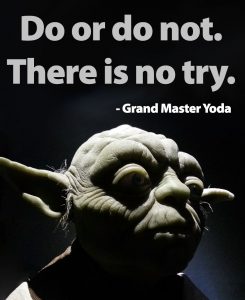 I would be remiss if I didn’t invoke the jedi master and point out that…
I would be remiss if I didn’t invoke the jedi master and point out that…
Do or do not. There is no try.
And right he was.
Now that we’ve determined that you can’t afford not to, you’ve moved beyond trying and into doing.
You will start a new online business – there’s no try about it. Whether it’s blogging, affiliate marketing, e-commerce, or even something more unconventional like becoming a seamstress and selling custom clothing.
Or if you already have one, and are struggling, perhaps wondering what’s wrong, now is the time to decide NOT to fail.
So the question now is that of how to avoid failure in an entrepreneurial business.
“How do I make sure that I do everything within my power to make it a success?”
For that, we need to understand three core principles:
- What Is Business Failure?
- How Do We Avoid Business Failure?
- How Do We Achieve Business Success?
Why Do Businesses (and People) Fail?
 There’s little mystery to failure and failed entrepreneurs. Sure, there are sometimes surprising circumstances that occur and have a powerful, negative impact on a business. But that’s not the norm.
There’s little mystery to failure and failed entrepreneurs. Sure, there are sometimes surprising circumstances that occur and have a powerful, negative impact on a business. But that’s not the norm.
I would say that the answer is sometimes right under your nose, but in fact it may be inside your head.
We can get in our own way, trip ourselves up. Habits or approaches or reactions can end up hurting our chances in the long run. They are silent killers since we can’t see them.
In his book about failed entrepreneurs, Why People Fail, my friend and SiteSell CEO Ken Evoy writes:
“As Founder of SiteSell Inc., I have seen hundreds of thousands of small-business people use SBI!’s process and tools. Posts in the Solo Build It! Forums (the best “help and be helped” community on the Internet) … reveal results that range from wild success to failure to not even getting started!
But such different outcomes?
What magic attribute separates the winners from the unsuccessful?
I’ve seen ordinary-IQ folks succeed beyond belief. And I’ve seen bright people fail miserably.
So the difference is not intelligence.
I’ve seen a few “lucky stiffs” come up with the right idea at the right place at the right time — don’t count on duplicating “lightning in a bottle.” I’ve also seen people try as hard as is humanly possible… and fall flat on their faces.
So the difference is not “trying hard,” although that certainly helps to improve the success equation, when combined with the refusal to give up and the ability to learn from failure.
The bottom line?
There is no single path to success. But there sure are clear habits that almost guarantee failure.”
In case you don’t already know Ken, he’s a former doctor who used to teach and practice Emergency Medicine at Mcgill University in Montreal, Canada. He was a successful serial entrepreneur before he started SiteSell.com in 1997.
There’s a long and winding road between then and my joining SiteSell as CMO in 2014. This video sums up 20 years nicely.
Ken discovered that most solopreneurs fail simply because they get overwhelmed – they need to focus on what they know, their niche, while Solo Build It! (our flagship product) takes care of everything related to business-building.
With SBI! you can use our step-by-step process, tools, guidance and support, and auto-updating. We can not only help you develop an effective online presence, but we will also teach you how to promote your website for free!
The result? SBI! delivers unmatched rates and levels of solopreneur success. But still, some did not succeed. Those interested Ken. Applying his medical training to a study of those who failed revealed a large group of people who simply got in their own way.
In other words, some failures are totally avoidable. Others can see it, but not the actual person, who can’t figure out what’s wrong.
What’s fascinating is that Ken goes on to outline 10+ personality types and attributes that will doom you to failure if left unchecked. He also includes three other patterns for failure that need to be recognized and managed.
For example:
Nah! No research or prep work is needed for me. My gut tells me what to do — start running, don’t worry about direction.
… I’m excited. I have a great idea. Let’s go. Just give it a shot…
… even if it’s in the dark.
Welcome to Mr./Ms. “FIRE-Ready-Aim.”
A great idea is easy. But executing that idea can take a year of your life.
Solopreneurs do not tend to think of failure in those terms. Sure it costs little to start an online business. So it costs little to fail…
But that’s only true if you value your time at zero. So getting back to Mr./Ms. “FIRE-Ready-Aim,” s/he’ll waste a year due to an insistence of using gut instinct. Research could have proven a flaw that destined the effort to fail!
The cautionary tale here is that jumping in with both feet and without a clue as to where you’re headed is a surefire way to enjoy a fast plummet with a sudden stop.
The good news is, if you take the time to review and seriously think about the points made in Why People Fail you’ll have an opportunity to identify potential problems before they become real issues, and correct them.
You’ll almost surely recognize yourself in this invaluable little book. You won’t be as badly off as the humorous exaggerations, but you’ll get the point. And that is the key…
Make the problem visible. Once you have insight, you can manage the issue and overcome any adversity that gets in your way. If you are looking for some inspiration, take a look at our article diving into what motivated Oprah Winfrey to become successful.
Do You Know What Failure Looks Like?
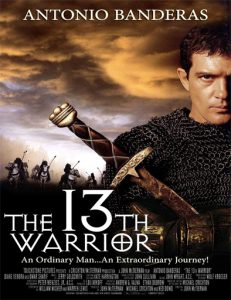 In 1999, Touchstone Pictures released a film adaptation of the Michael Crichton book, Eaters of the Dead – later retitled The 13th Warrior.
In 1999, Touchstone Pictures released a film adaptation of the Michael Crichton book, Eaters of the Dead – later retitled The 13th Warrior.
The story follows an exiled Arab poet through his journey into northern Europe and his adventure alongside a group of Norse barbarians.
The movie is filled with action, suspense, and interesting dialogue from Antonio Banderas as the poet, Ahmad ibn Fadlan.
I’ve always enjoyed the film, and particularly liked the great Omar Sharif’s minor role as Ahmad’s guide.
The movie was a complete disaster.
Production of the film, which included elaborate sets and costume design, ran northwards of $160,000,000, yet box office proceeds were a paltry $61,700,000.
That movie lost Touchstone one hundred million dollars! Yikes!
It was so bad, Sharif reportedly retired from acting for years saying, “Bad pictures are very humiliating.”
When it’s as simple as looking at a dollar amount investment and comparing it against a dollar amount return, determining success or failure is simple.
What about when it’s not quite that cut and dried?
The fact is, success doesn’t look the same to everyone. We can certainly all agree that it’s the absence of failure.
But to really understand what solopreneur success looks like, and how to completely eliminate failure, I want to introduce you to a new book from Ken:
Coulda-Woulda-Shoulda: Turning Solopreneur Failure into Solopreneur Success
There are of course other ways to fail beyond tripping all over yourself. Ken has pushed beyond his original booklet into a complete study of solopreneur failure.
This is the type of unique work that can only come from someone with Ken’s unique background, along with 20 years of working with solopreneurs.
There is nothing online like this. It’s something that every solopreneur should read. The worst that could happen is that you discover you are perfect and learned nothing.
Everyone else is going to thank me for sharing this remarkable 47-page addition to solopreneurship literature.
Good Defence Is as Important as Great Offence
Blocking a basketball shot is not as sensational as making a long basket with a perfect shot, but it’s just as valuable.
Start winning by blocking failure!
To do that, you need to know every possible point of failure by solopreneurs.
This book will help you identify those failure points so that you can move past them, enabling you to realize your potential and achieve success — and the personal freedom that comes with it.
Once you clear the road to success, all you need is the right roadmap.
How to Avoid Failure in an Entrepreneurial Business: How Do We Achieve Business Success?
What is one way for an entrepreneur to decrease risk? How can you help prevent your own business from failing?
After you’ve read Why People Fail and Coulda-Woulda-Shoulda: Turn Solopreneur Failure into Solopreneur Success, you will have a complete picture of what failure looks like, why it happens to different kinds of people, and how to completely avoid and eliminate it from your business-building efforts.
The next step is a time-tested and proven process for growing a business that’s built to last.
As Ben Franklin said, “By failing to prepare, you are preparing to fail.” And preparation through the use of a process is definitely important. But perhaps what’s more important is choosing the right process.
How do you know that a process for building an online business is the right one?
Just look for proof.
- What are the key success factors in business?
- Where are the case studies from different industries and approaches?
- How does the typical entrepreneur perform compared to others?
- Who are some of the people using and recommending the process?
Here at SiteSell, the process part of our Solo Build It! business-building platform is called C T P M and it represents the core of training and business philosophy.
And do we offer proof? We sure do. But no one else does.
You’re ready to conquer failure. With Solo Build It! and an entire community of like-minded solopreneurs by your side, you’re ready to succeed at building an online business.
That’s the SBI! Advantage.
You’re Ready to Win!
The 90 Day “Confidence of Success” Guarantee turns “purchase” into risk-free trial.
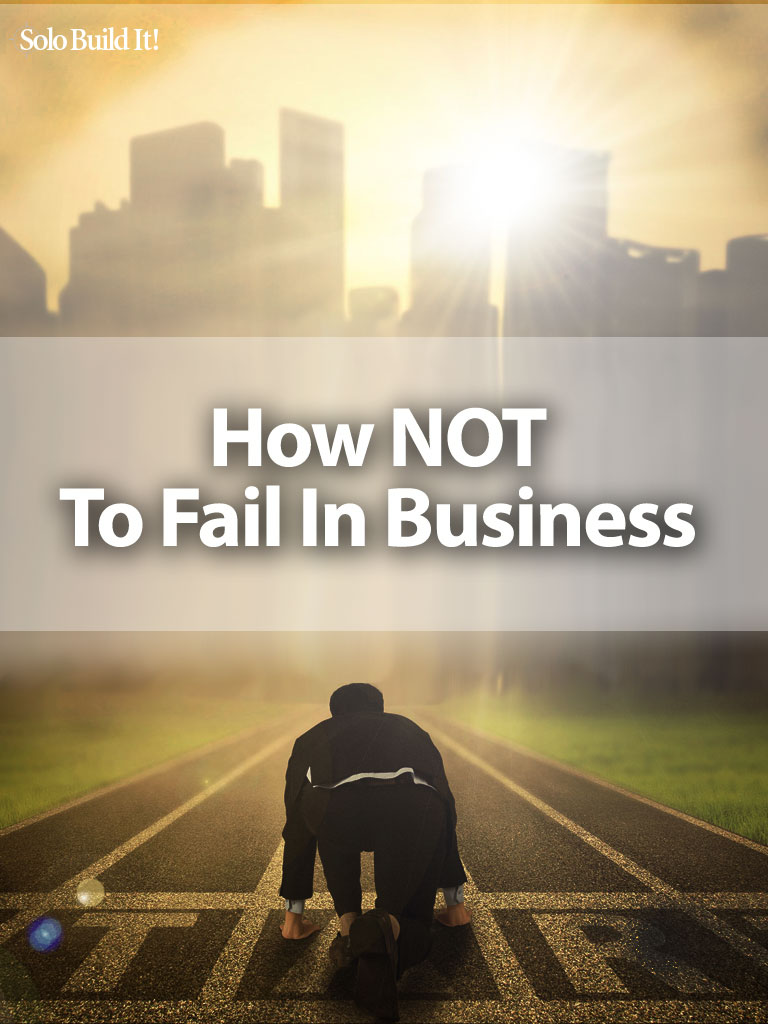
Latest posts by Mike Allton (see all)
- How to Avoid Failure in an Entrepreneurial Business - September 23, 2019
- How to Use Buffer for Social Media Management: The Solopreneur’s Guide - September 15, 2019
- Wix Review: An In-Depth Comparison of 10,000 Websites - September 1, 2019

